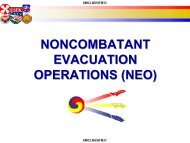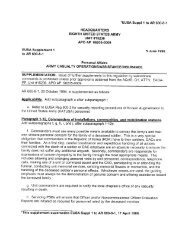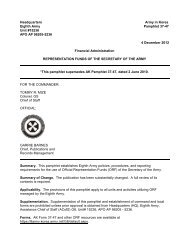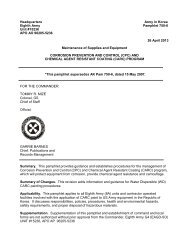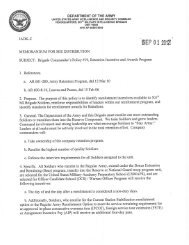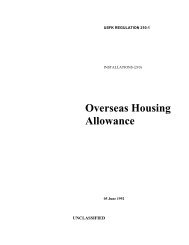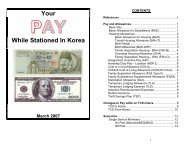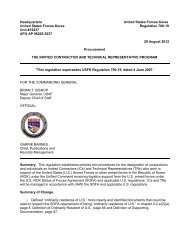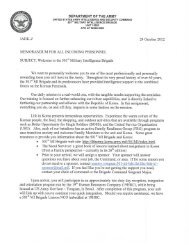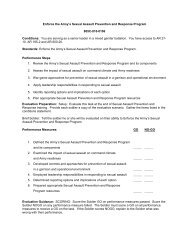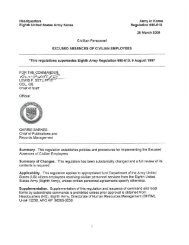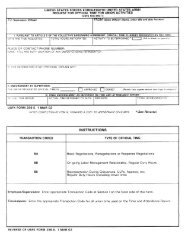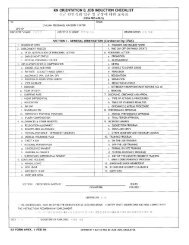AK Pamphlet 350-20 Eighth Army Range and Training Area
AK Pamphlet 350-20 Eighth Army Range and Training Area
AK Pamphlet 350-20 Eighth Army Range and Training Area
You also want an ePaper? Increase the reach of your titles
YUMPU automatically turns print PDFs into web optimized ePapers that Google loves.
Section V<br />
RANGE SAFETY POLICIES<br />
26. GENERAL. Persons in charge of or using ranges, maneuver areas, <strong>and</strong> training facilities<br />
are responsible for compliance with the safety requirements of AR 385-63, DA Pam 385-63, AR<br />
385-64 , <strong>AK</strong> Regulation <strong>350</strong>-10, this <strong>Pamphlet</strong>, SDZ waivers, safety briefings, SOPs, <strong>and</strong><br />
applicable Technical <strong>and</strong> Field Manuals.<br />
27. SURFACE DANGER ZONE WAIVER/DEVIATIONS.<br />
a. The Korean peninsula is made up of mostly hills <strong>and</strong> mountains with some<br />
wide coastal plains in West <strong>and</strong> South. The peninsula is approximately the size of<br />
Indiana with large built-up areas <strong>and</strong> farml<strong>and</strong> spread throughout; therefore, l<strong>and</strong><br />
usage is at a premium. This restricts weapon systems from being used to their<br />
maximum range. Often it requires a waiver/deviation from the SDZ as is prescribed in<br />
DA PAM 385-63.<br />
b. All <strong>Eighth</strong> <strong>Army</strong> ranges <strong>and</strong> ROK ranges used by U.S. units require waivers. The<br />
RCC will make the initial determination regarding the waiver of a range. RCC personnel will<br />
develop waivers as warranted. Waiver request must be submitted to the servicing RCC NLT 45<br />
working days prior to event.<br />
28. RANGE SAFETY PROGRAM.<br />
a. The <strong>Eighth</strong> <strong>Army</strong> <strong>Range</strong> Safety Program is monitored by the <strong>Eighth</strong> <strong>Army</strong> Comm<strong>and</strong><br />
Safety Office <strong>and</strong> enforced by the <strong>Eighth</strong> <strong>Army</strong> MACOM <strong>Range</strong> Manager. RCC personnel are<br />
responsible for the enforcement of range <strong>and</strong> safety regulations. Their authority on ranges <strong>and</strong><br />
training areas is indisputable. An organization experiencing a difference of opinion with RCC<br />
personnel will comply with guidance given by the RCC immediately at the time guidance is<br />
given. Issues not favorably resolved may then be appealed to the servicing RCC <strong>Range</strong> Officer<br />
or the MACOM <strong>Range</strong> Manager.<br />
b. Some ranges <strong>and</strong> training areas have facility-specific safety briefings <strong>and</strong>/or SOPs<br />
that must be acknowledged by signature of the ROIC/RSO prior to the RCC granting a “HOT”<br />
status. The servicing RCC will advise units of these requirements.<br />
29. ROIC/RSO SAFETY CERTIFICATION. ROICs <strong>and</strong> RSOs are required to have a current<br />
<strong>Range</strong> Safety Certification Card issued from a RCC. Cards are valid for one year at which time<br />
personnel will be retested.<br />
30. ROIC/RSO DE-CERTIFICATION.<br />
a. The servicing RCC will decertify a ROIC/RSO for safety/procedural violations,<br />
disregarding range SOP <strong>and</strong> other applicable documents, <strong>and</strong> failure to follow guidance<br />
provided by RCC.<br />
b. De-certification requires the soldier to re-certify by taking the ROIC/RSO test after a<br />
60-day period.<br />
17<br />
<strong>AK</strong> Pam <strong>350</strong>-<strong>20</strong>, 10 October <strong>20</strong>06



